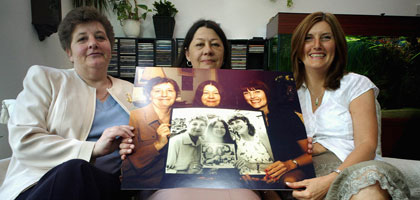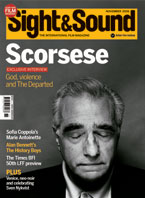NOZONE - Life and nothing but
DVD review: 49 Up

Tim Lucas assesses the enduring fascination of a classic piece of documentary television
Michael Apted, UK 2005; First Run Features, Region 1; Aspect ratio: 1.78:1; Features: Roger Ebert interview with Michael Apted
Two years ago, First Run Features issued The Up Series, a five-disc boxed set collecting the first seven of Michael Apted's every-seven-years documentary visits into the lives of a selection of Britons born circa 1956. Taken as a whole (and even more so as a box set) the Up series offers a compelling study of human development and the influences of environment, opportunity, education, love and loneliness (and even the stress of committing to a lifelong documentary film project) on a variety of different, yet distinctly British, personalities. The latest addition to the series, to be released by FRF as an anamorphically enhanced disc in early November, was first broadcast on ITV in September 2005; it finds the participants on the eve of 50. It would seem that they have changed little since they were 42... but the world is changing around them.
The subjects' once riotously divergent personalities and energies level here to a common calm: the philosophic resignation that comes as dreams are surrendered, parents are buried and grandchildren are born. Much is the same with everyone, and yet change is foremost in everyone's mind: the Eastenders shake their heads at their old neighbourhoods, now heavily populated by people from different countries and cultures; 42 Up's interesting development of the friendship between schoolteacher Bruce Balden and the floundering, homeless, possibly schizophrenic Neil Hughes (a friendship which gave the latter the foundation from which to launch a political career) has petered out as Balden has settled into belated married life and fatherhood, and Hughes has stabilised in his work as a district councillor; and Tony Walker, the boisterous jockey-turned-cabbie with a part-time acting career, has bought a second home in Spain, which he finds to be more British these days than his native East End. Nick Hitchons, a scientist now residing in Wisconsin who has far outshone the others professionally, has since divorced (as Apted predicted he would when he first married in 28 Up); we find him in a new relationship, but is shaken by the recent failure of an ambitious computer project many years in development.
Two of the original participants in the series, middle-class lads Peter Davies and Charles Furneaux, dropped out awhile ago, and others, such as the upper-class John Brisby and Andrew Brackfield (both of whom had their entire futures accurately mapped out at the age of seven) and working-class Symon Basterfield, have been in and out over the years. Apted seldom addresses the reasons for these no-shows and never alludes to the problems he's been reported to have had with some participants, such as Brisby's insistence on being interviewed by a crew member other than Apted for 35 Up, or Furneaux's legal attempt to have himself eliminated from the archival footage of 49 Up. Perhaps commendably, Apted has fought to remain true to the programme's original prospectus, and has resisted the inclination to make these updates about the programme itself. But, truth be told, this series has become increasingly about the impact of the programme on its participants. For example, 49 Up is never more gripping than when Walker's wife admits that their teenage daughter refused to leave her room for three weeks after her father admitted to his marital infidelities on national television in 35 Up. At the other end of the spectrum, Suzanne Dewey, whom the series has followed from childhood as an amusingly self-absorbed ballerina, to a shy teen, to an embittered and petulant chain-smoker of a young adult, to a happily married mother, confesses to feeling as though her participation in the series has probably reached a dead end. Placidly weary of Apted's renewed intrusions and having to revisit unhappy memories she has long since moved beyond, she announces that 49 Up is likely to mark the end of her participation.
There is a perfunctory air of obligation about this instalment, on both sides of the camera, that makes one wonder whether the series hasn't met its mandate. It doesn't help that the series' longevity now ensures that the new material (shot on digital video) is overwhelmed by the volume of archival footage (shot on film); one doubts there is more than 80 minutes of new content in this 180-minute feature, a poor return for a seven-year wait, which naturally prevents Apted from probing very deeply into the present lives of his cast. Even in this short time, we catch glimpses of their fears: of ageing, separation, mortality and, perhaps most profoundly (given the theme of the series), that love of country may not be mutual. Some of the principals are no longer British residents, and some of the stay-at-homes are lamenting that their Britain no longer exists. Stay tuned for 56 Up.


